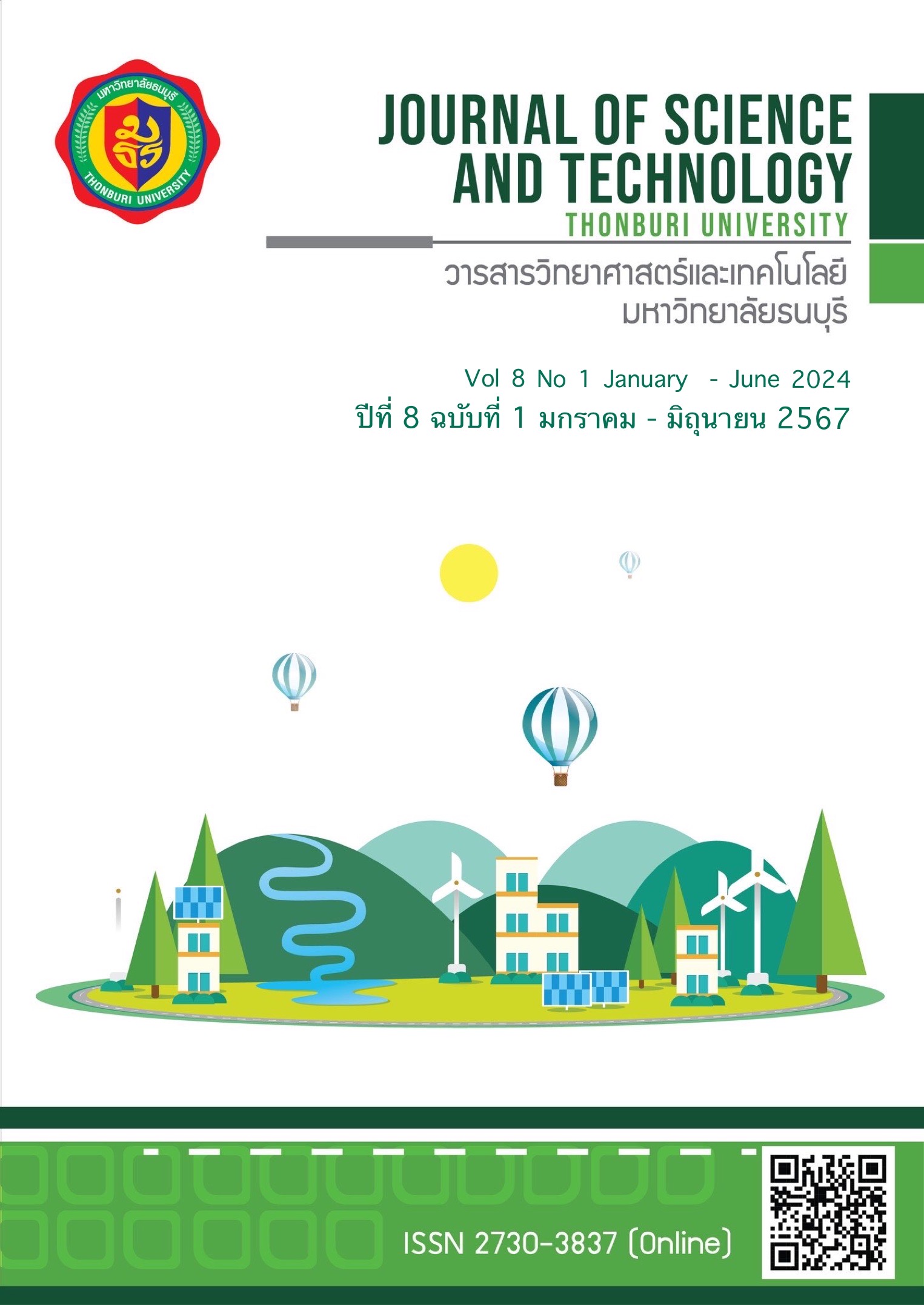DEVELOPMENT OF MANAGEMENT MODEL FOR INNOVATION PLATFORM IN MEDICAL ARTIFICIAL INTELLIGENCE INDUSTRY IN CHINA
คำสำคัญ:
Management Model, Innovation Platform, Medical Artificial Intelligence, Platform Empowermentบทคัดย่อ
This study aims to develop an innovation platform management model to address issues in medical AI Industry in China and promote its future development. The first step is to analyze the existing problems, opportunities and innovative solutions in the medical AI industry in China by literature analysis and in-depth interview with five experts. The second step is to evaluate the consistency of innovation platform management elements for the medical AI industry in China by expert confirmation process with 17 experts. The final step is to create the innovation platform management model and confirm by 5 experts. The findings of this study are as follows: (1) It identified 5 aspects, 11 themes and 35 elements for innovation platform management in medical AI industry in China. Experts agree on the necessity of a multi-faceted approach to foster innovation, emphasizing the importance of data privacy, domain knowledge base development, interdisciplinary talent cultivation, clinical-AI integration, organizational management. (2) The proposed management model presents a comprehensive framework encompassing five aspects: infrastructure management, technology innovation management, application scenarios management, policy and regulation management, and platform organization management. This study emphasizes the importance of stakeholder collaboration and the utilization of the innovation platform to facilitate the industry development.
เอกสารอ้างอิง
Čartolovni, A., Tomičić, A. & Mosler, E. L. (2022). Ethical, Legal, and Social Considerations of AI-based Medical Decision-support Tools: A Scoping Review. International Journal of Medical Informatics, 161, 104738, ISSN 1386-5056, https://doi.org/10.1016/j.ijmedinf.2022.104738.
Chen, X. (2022). Research on the Development Status and Countermeasures of Scientific and Technological Innovation Platform -- Take Zhuzhou City, Hunan Province as an Example. Technology and market (11), 41-43.
Bombaywala, M., Riandita, A. (2015). Stakeholders’ Collaboration on Innovation in Food Industry. Procedia - Social and Behavioral Sciences, 169, 395-399, ISSN 1877-0428, https://doi.org/10.1016/j.sbspro. 2015.01.325.
Davis Hicks, W., Schmeidler, E. & Kirchner, C. (2004). Investigating Question Meaning and Context Through In-Depth Interviews. Quality & Quantity 38, 367–379, https://doi.org/10.1023/B:QUQU.0000043133. 61603.e9
Gawer, A., Cusumano, M. A. (2014). Industry Platforms and Ecosystem Innovation. Journal of Product Innovation Management, 31, 417-433, ISSN: 0737-6782, https://doi.org/10.1111/jpim.12105
Goluchowicz, K., & Blind, K. (2011). Identification of Future Fields of Standardisation: An Explorative Application of the Delphi Methodology. Technological Forecasting and Social Change, 78(9), ISSN 1526–1541. https://doi.org/10.1016/j.techfore.2011.04.014.
Ji, P., Zhu, D., Xiao, P., Xu, W., & Guo, R. (2022). Risk Assessment and Response in Medical Artificial Intelligence Research. Medicine and Philosophy (08), 7-9+28.
Qiu et al. (2023). Large AI Models in Health Informatics: Applications, Challenges, and the Future. IEEE Journal of Biomedical and Health Informatics, 27,(12), 6074-6087, doi: 10.1109/JBHI.2023.3316750.
Liao, Z., Tian, X., & Liu, Y. (2021). The Enlightenment of Japan's Medical Big Data Law on the Development and Application of Health and Medical Big Data in China. Digital Medicine (07), 88-93.
Li, C., Yang, K., Lei, Z., Lim, M. K., & Hou, Y. (2022). Exploring Stakeholder Collaboration Based on the Sustainability Factors Affecting the Sharing Economy. Sustainable Production and Consumption, 30, 218-232, ISSN 2352-5509 ,https://doi.org/10.1016/j.spc.2021.12.009.
Liu, H., Liu, M., Tang, S., Liu, J., Liao, Z., Xu, Y., & Zhou, Y. (2023). Research on the Application and Development of New Infrastructure for Medical Artificial Intelligence China. Digital Medicine (08), 1-7
Lucas, S.R. (2014). Beyond the Existence Proof: Ontological Conditions, Epistemological Implications, and In-depth Interview Research. Qual Quant 48, 387–408, https://doi.org/10.1007/s11135-012-9775-3.
Lu Juan (2020). Opportunities and Challenges of Artificial Intelligence Under New Infrastructure Robotics Industry. doi: 10.19609/j.cnki.cn10-1324/tp.2020.03.005
Luo, F. (2021). The Commercialization Dilemma of Artificial Intelligence Healthcare. Zhangjiang Technology Review. (05), 40.
MacDonald, B., I., A., Wright, G., & Hamlin, I. (2019). Improving the Practical Application of the Delphi Method in Group-based Judgment: A Six-step Prescription for a Well-founded and Defensible Process. Technological Forecasting and Social Change, 147, 72–82. https://doi.org/10.1016/j.techfore.2019. 07.002.
Okoli, C., & Pawlowski, S. D. (2004). The Delphi Method as a Research Tool: An Example,design Considerations and Applications. Information & Management, 42(1), 15–29. https://doi.org/10.1016/j.im.2003.11.002
Orrange, R.M. (2003) Individualism, Family Values, and the Professional Middle Class:In-Depth Interviews with Advanced Law and MBA Students. The Sociological Quarterly, 44(3), 451-480, DOI: 10.1111/j.1533-8525.2003.tb00541.x
Reddy, S., Allan, S., Coghlan, S., Cooper, P. (2020). A Governance Model for the Application of AI in Health Care. Journal of the American Medical Informatics Association, 27(3), 491–497, https://doi.org/ 10.1093/jamia/ocz192
Kafhali, S.E., Alzubaidi, L., Al-Sabaawi, A., Bai, J., Dukhan, A., Alkenani, A.H., AlAsadi, A., Ouyang, J. H.A. & Gu, A. Y. (2023). Towards Risk-free Trustworthy Artificial Intelligence: Significance and Requirements. International Journal Intelligence. System, Article ID 4459198, 41 https://doi.org/10.1155/2023/4459198
Shen, X., Li, M., Nan, J., Zhang, W., Sun, Y., Cha, M., & Gao, D. (2023). Analysis of the Development Trend and Problems of Medical Artificial Intelligence. Science and Technology Management Research (07), 193-198.
Shi, Z., & Liu, Z. (2021). Pay Attention to the Standardization of Medical Image Artificial Intelligence Database. Concord Medical Journal (05), 599-601.
Sun, Y., Gao, J., & Wu, J. (2021). Clinical Medical Artificial Intelligence: Typical Applications and Challenges. Chinese Journal of Stroke, 16(7).
Braun, T. & Harasimiuk, D. E. (2023). AI Deployment in Medical Devices-Ethical and Regulatory Reflections, Beyond Data Protection and Bias – EU perspective. 2023 IEEE Conference on Computational Intelligence in Bioinformatics and Computational Biology (CIBCB), Eindhoven, Netherlands, 2023, 1-6, doi:10.1109/CIBCB56990.2023.10264892.
Tripathi, N., Hietala, H., Xu, Y., & Liyanage, R. (2024). Stakeholders Collaborations, Challenges and Emerging Concepts in Digital Twin Ecosystems. Information and Software Technology, 169, 107424, ISSN 0950-5849, https://doi.org/10.1016/j.infsof.2024.107424.
Tsujimoto, M., Kajikawa, Y., Tomita, J., & Matsumoto, Y. (2018). A Review of the Ecosystem Concept — Towards Coherent Ecosystem Design. Technological Forecasting and Social Change, 136, 49-58, ISSN 0040-1625, https://doi.org/10.1016/j.techfore.2017.06.032.
Van der Borgh, M., Cloodt, M. & Romme, A.G.L. (2012). Value Creation by Knowledge-based Ecosystems: Evidence from a Field Study. R&D Manage, 42, 150-169. ISSN: 0033-6807, https://doi.org/10.1111/j.1467-9310.2011.00673.x
Von der Gracht, H. A. (2012). Consensus Measurement in Delphi Studies: Review and Implications for Future Quality Assurance. Technological Forecasting and Social Change, 79, 1525-1536.
Wang, H., Chen, Y., & Zhao, K. (2020). The Current Situation of the Development of China's Artificial Intelligence Medical Industry and International Experience. Health Economics Research (09), 9-11+15. doi: 10.14055/j.cnki.33-1056/f.2020.09.002.
Wu Y. (2019). The Application and Reflection of Deep Interview Method in Field Investigation of White Deer. Plain New West (15), 31-34
Yang, S., & Sun, F. (2005). In Depth Interviews as a Means of Exploration. Sociological Research (05), 53-68+244 Doi: 10.19934/j.cnki.shxyj.2005.05.003
Yuan, J., Zhao, L., & Tian, D. (2020). The Application and Thinking of the new Generation of Artificial Intelligence in the Medical and Health Field. China Journal of Health Information Management (06), 780-785.
Zhao, Z., & Zhuang, X. (2023). High Quality Development of Artificial Intelligence in China. Current Situation, Problems and Strategies Reform (09), 11-20
Zhu, W., & Lv, W. (2022). Development Status and Prospect of Medical AI. Radiological Practice (01), 1-3. doi: 10.13609/j.cnki. 1000-0313.2022.01.001.
ดาวน์โหลด
เผยแพร่แล้ว
รูปแบบการอ้างอิง
ฉบับ
ประเภทบทความ
สัญญาอนุญาต
ลิขสิทธิ์ (c) 2024 Tang Yuying, ณัฐดนัย สิงห์คลีวรรณ, สิริกาญจน์ โพธิ์เขียว, สมบัติ ทีฆทรัพย์

อนุญาตภายใต้เงื่อนไข Creative Commons Attribution-NonCommercial-NoDerivatives 4.0 International License.




